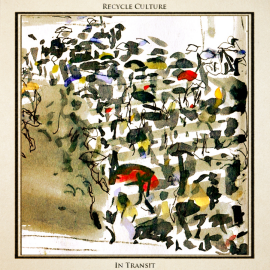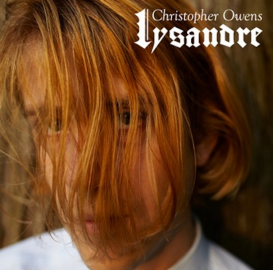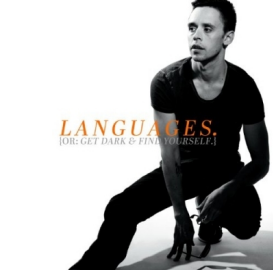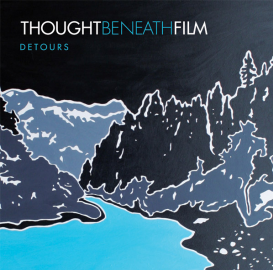Recycle Culture
In Transit
Between words (exposure, attachments) and silence (unknowability, forgetting), Recycle Culture’s In Transit moves, picking up snatches of conversation, sounds, movements. Unlike Recycle Culture’s somewhat popular remixes, In Transit is both quiet, a calm ambient space that encourages imagination to fill in gaps and anticipate changes, unrepetition. In Transit’s four parts pass through two or three movements, passing through styles and moods in lengthy expanses (each approaches 10 minutes) but avoiding the stuckness sometimes associated with the genre. Layers of sound come and go, electronic then live, crowded and approaching heights of volume then silent, fading, and translucent – every part is partly visible throughout In Transit, and all the background matters. Perhaps the best part, if one can be said to matter more than any of the others, is the second through fourth movements of “Pt. 4,” where ticking drives the beat, the crowd of a waiting area gives way to a studied (dis)quiet of piano and synthetic strings before a saxaphone signals the end – something close to, yet stranger and slower than the work of Trent Reznor and Atticus Ross for David Fincher, and a plaintive surprise to open the year.
Christopher Owens
Lysandre
Best known for his work as the frontman and songwriter of San Francisco-based Girls, the indie rock critical darlings who he unexpectedly left in July of last year, Christopher Owens’ solo debut is a complete departure from his work with the band. Lysandre is a loose concept album, and acts as a diary about touring for the first time with Girls and a long distance affair he had with the titular Frenchwoman. Owens masterfully minimalist songwriting, frank and potent, yet naive and universal is on display on Lysandre, as his doo-wop flavour and wry pop melodies come across as charismatic and infectious rather than tacky or cringe-worthy. Summing up his approach to music on “Love Is In The Ear of The Listener,” The wide-eyed Owens first asks, “What if I’m just a bad songwriter, and everything I say has been said before?” before concluding, “Well, everything to say has been said before, and that’s not what makes or breaks a song.” He’s playful and has fun on Lysandre, and although there will be better albums this year, there probably won’t be any quite as honest.
Owen Thomas
Languages…
Languages {Or: Get Dark & Find Yourself.}, the excessively-punctuated debut solo record from The Elms’ former front man, comes as somewhat of a surprise. Arriving over two years after the break-up of the prolifically-touring Indiana rock quartet, Languages launched the day it was announced. Stepping back from The Elms’ barnstorming Midwestern rock, Languages focuses on more open pop numbers and Thomas himself rather than fallow fields and rusted train yards. Its best tracks propelled by fuzz-bass lines and hard-wired backbeats like “Houdini.,” “I Am High Above You.,” and “What You Say & What You Do.” Here Thomas often dwells in much quieter, more reflective territory, like on “Factors.,” stripped of most percussion apart from shaker and occasional tambourine and anchored by a constant organ note. Directly inspired by personal circumstance and crafted in a fairly brief time frame, the album can veer into almost uncomfortably autobiographical territory. The specific details grant listeners insight into Thomas’ inner state sometimes robbed of metaphor. Unchanged from his earlier work is Thomas’ considerable melodic instincts and knack for a killer bridge. It’s fascinating to see him work new ground, like the bopping folk track “Take My Heart To The Bottom,” which wouldn’t have felt so out of place on Taylor Swift’s Red.
Thought Beneath Film
Detours
Thought Beneath Film—a still-obscure five-piece Ontario band named after an Emily Dickinson poem—self-define their music on Twitter as “noisy, gritty pop jams.” Their five-song EP is filled with just such made-for-radio pop-rock tunes. While it comes off a little too superficial and overproduced, each track is easy on the ears; I’m not typically a fan of “she-bop” as a lyric in a song, but I didn’t mind it in “Sixty Six.” Truthfully, I like the album, it hits the right notes for me – but I’m also a little embarrassed to admit it. They sound like a tamer, parent-friendly version of Green Day or Blink 182 – appropriate, considering the album was mixed by Tom Lord-Alge and mastered by Bob Ludwig who are known for working with those bands (not to mention Nirvana, Coldplay and Weezer). Thought Beneath Film is clearly squeezed out of the same tube. I actually think “If I Could Fix You (You Know That I Would)” is catchy enough to get some major airtime – and maybe that was the goal of this EP. Although, released in late summer, the time for that may have already passed.






